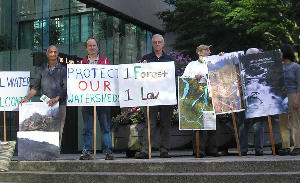
West Coast is excited to unveil our new and improved Environmental Dispute Resolution Fund (EDRF). For the last 25 years West Coast Environmental Law has offered environmental legal aid to British Columbians through the EDRF (our 20th Anniversary publication, On the Ground, reports some of the many and varied wins and accomplishments that the fund has had).
A recent review of the EDRF’s last 5 years, which included interviews with EDRF clients, allies, lawyers, and much internal reflection, convinced us that we can be more effective and efficient by strategically funding cases we think we can win legally, but which also help build a community that cares about environmental protection.
What we learned from looking at our past wins and losses
It is often the case that internal reflection and learning starts with a loss.
Late last year we were given the sad news that the EDRF would have to undergo funding cuts as reduced interest rates have cut the budget of the Law Foundation of BC (our funder). Though this was a disappointment, we knew it was also an opportunity to take stock of our granting approach. As one of the only funds in Canada (and beyond!) we know of that supports community-driven public interest environmental law, the EDRF is a unique institution that deserves to be leveraged as powerfully as possible for the BC communities it supports. The Law Foundation generously provided resources for this evaluation process.
We estimate that the $5 million we’ve disbursed since the EDRF began in 1988 has leveraged what translates to over $20 million in legal and expert work at market rates, and likely the same value of community volunteer work from skilled and highly committed individuals. So how could we make our funding model even more efficient than this?
Across the board, we received feedback that the EDRF is valued for much more than providing money - we are also valued for our legal information and advice, credibility and moral support, referrals and advice on other aspects of a case. In a word, we make taking on a legal case accessible to the small groups around the province that are closest to the issues, and we follow their lead on what they feel matters. This comes from our core belief that, as former client Rick Zammuto puts it, “the grassroots organizations [that the EDRF supports] are so vital to the bigger issues…we’re on the ground, we’re on the frontlines, we’re seeing these things on a daily basis.”
We learned, from looking at past wins and losses, that groups whose legal strategy was a part of a broader campaign and who used their legal fight to promote a broader community dialogue were more likely to win their case. And those same groups were more likely to put down roots to fight future environmental battles. Our funding “sweet spot” is supporting community groups that work proactively with their EDRF lawyer to develop a legal strategy to achieve environmental wins and to raise environmental awareness in their community.
The EDRF is most effective when it is used as a catalyst for community campaigns that use a broader strategy including several tactics to ensure concrete environmental wins.
At the end of the day we decided to focus our funding on the niche only we can fill—community-led cases—selecting for, and investing in, those with the greatest potential for mobilizing human resources and social capital to make change.
A 2-stage funding process
We’re now launching a new two-stage funding process.
- In Stage One, new clients will be invited to apply for a small "community legal action seed grant” focused on initial legal advice and action. These cases will cultivate the capacity of clients to use legal advice to drive a broader strategy to achieve their environmental goal.
- In Stage Two, we provide fewer but larger community legal action grants to groups that are able to build a base of support, leverage legal work to achieve a clear environmental objective, and run a campaign that includes fundraising in their community and beyond. Recognizing that we do not have the resources to provide full support, these “community legal action grant” applicants will need to demonstrate how they will raise additional funding to run their case.
Ultimately, we were able to turn challenge into opportunity and create a new model for the EDRF that we feel will support community groups and promote environmental dialogue in BC like never before. We’re grateful for the ongoing financial support from the Law Foundation of British Columbia to continue the EDRF’s important work.
[Update 30 Jan, 2015 - Join us for a webinar on the new EDRF next Tuesday, February 3rd.]
By Barbara Everdene, EDRF Project Manager